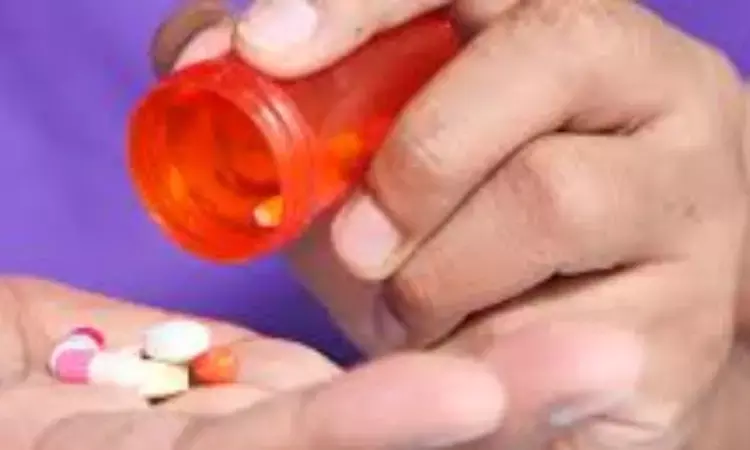- Home
- Medical news & Guidelines
- Anesthesiology
- Cardiology and CTVS
- Critical Care
- Dentistry
- Dermatology
- Diabetes and Endocrinology
- ENT
- Gastroenterology
- Medicine
- Nephrology
- Neurology
- Obstretics-Gynaecology
- Oncology
- Ophthalmology
- Orthopaedics
- Pediatrics-Neonatology
- Psychiatry
- Pulmonology
- Radiology
- Surgery
- Urology
- Laboratory Medicine
- Diet
- Nursing
- Paramedical
- Physiotherapy
- Health news
- Fact Check
- Bone Health Fact Check
- Brain Health Fact Check
- Cancer Related Fact Check
- Child Care Fact Check
- Dental and oral health fact check
- Diabetes and metabolic health fact check
- Diet and Nutrition Fact Check
- Eye and ENT Care Fact Check
- Fitness fact check
- Gut health fact check
- Heart health fact check
- Kidney health fact check
- Medical education fact check
- Men's health fact check
- Respiratory fact check
- Skin and hair care fact check
- Vaccine and Immunization fact check
- Women's health fact check
- AYUSH
- State News
- Andaman and Nicobar Islands
- Andhra Pradesh
- Arunachal Pradesh
- Assam
- Bihar
- Chandigarh
- Chattisgarh
- Dadra and Nagar Haveli
- Daman and Diu
- Delhi
- Goa
- Gujarat
- Haryana
- Himachal Pradesh
- Jammu & Kashmir
- Jharkhand
- Karnataka
- Kerala
- Ladakh
- Lakshadweep
- Madhya Pradesh
- Maharashtra
- Manipur
- Meghalaya
- Mizoram
- Nagaland
- Odisha
- Puducherry
- Punjab
- Rajasthan
- Sikkim
- Tamil Nadu
- Telangana
- Tripura
- Uttar Pradesh
- Uttrakhand
- West Bengal
- Medical Education
- Industry
Low dose clozapine effective in Indians with drug induced tardive dyskinesia and dystonia, finds study

A new study published in the Asian Journal of Psychiatry showed that people of Indian heritage require lower effective dosages of clozapine for drug induced tardive dyskinesia and tardive dystonia when compared to Western populations. Long-term usage of dopamine antagonists can cause delayed-onset movement problems known as tardive syndromes (TS). Clozapine has been recommended for the treatment of TS in earlier research, showing symptom relief in as little as 1 to 3 months. Thus, by examining the clinical records of patients at a tertiary care hospital who first reported with tardive dyskinesia, tardive dystonia, or both, this retrospective study by Sandeep Grover and his team assessed the long-term efficacy of clozapine in treating TS.
Reduction of symptoms on the Unified Dystonia Rating Scale (UDRS) and Abnormal Involuntary Movement Scale (AIMS) was the main end measure. A total of 66 participants from a larger cohort of 1050 patients who mostly suffered from schizophrenia and a lesser percentage with affective disorders were included in the current study. All of the patients were followed for TS after using antipsychotics for an extended period of time.
- When commencing clozapine, 69.7% of the subjects had dyskinesia and 74.2% had dystonia, whereas 48.5% of the patients had both tardive dyskinesia and tardive dystonia symptoms. The mean age of this group was 41.83 years, and most of the people were men.
- The patients had previously been exposed to a variety of antipsychotics, and the majority had received treatment with second-generation antipsychotics such as olanzapine and risperidone. In more than 74% of instances, these interventions were linked to the development of TS.
- Nearly 72.2% of patients saw a reduction in AIMS scores of at least 50% throughout the roughly 33-month follow-up period, with 66.6% achieving a reduction of at least 75%. Of the patients, 54.5% had complete remission of tardive dyskinesia, while 56.1% had remission of tardive dystonia.
Moreover, the greatest gains were seen in individuals with higher baseline AIMS and UDRS scores. Overall, although the results of this study indicate that the distinction between psychotic disorders and other mental illnesses is not as great as documented in studies from other regions of the world, they do support the use of greater dosages in individuals with psychotic disorders.
Reference:
Grover, S., Chaurasia, N., & Chakrabarti, S. (2024). Management of tardive dyskinesia and tardive dystonia with clozapine: A retrospective study. In Asian Journal of Psychiatry (Vol. 102, p. 104245). Elsevier BV. https://doi.org/10.1016/j.ajp.2024.104245
Neuroscience Masters graduate
Jacinthlyn Sylvia, a Neuroscience Master's graduate from Chennai has worked extensively in deciphering the neurobiology of cognition and motor control in aging. She also has spread-out exposure to Neurosurgery from her Bachelor’s. She is currently involved in active Neuro-Oncology research. She is an upcoming neuroscientist with a fiery passion for writing. Her news cover at Medical Dialogues feature recent discoveries and updates from the healthcare and biomedical research fields. She can be reached at editorial@medicaldialogues.in
Dr Kamal Kant Kohli-MBBS, DTCD- a chest specialist with more than 30 years of practice and a flair for writing clinical articles, Dr Kamal Kant Kohli joined Medical Dialogues as a Chief Editor of Medical News. Besides writing articles, as an editor, he proofreads and verifies all the medical content published on Medical Dialogues including those coming from journals, studies,medical conferences,guidelines etc. Email: drkohli@medicaldialogues.in. Contact no. 011-43720751


